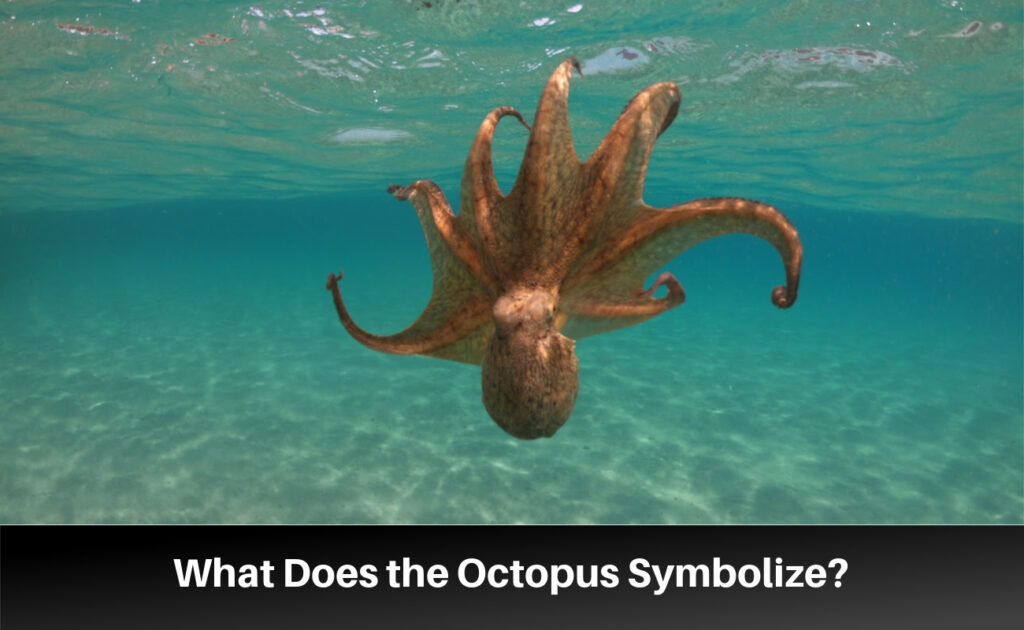Octopus symbolism is found in cultures all over the world because the creatures are so different from us. Octopi have eight arms, three hearts, and a mind that is different from us mammals. Each arm has its own brain, for starters. Giving the octopus a total of nine brains.
Yet their minds are keen, adaptable, and able to solve complex problems. Octopi have no bones or ability to speak, either. Yet they use tools, communicate to each other through color, and have the ability to camouflage themselves to escape notice.
What Does the Octopus Symbolize?

The unique powers these animals hold inform the symbolism and spiritual meaning of an octopus. Choosing an octopus as a tattoo or personal symbol suggests you value intelligence, insight, flexibility, and willpower.
Resilience
Resilience is another trait that octopi and their relatives the squid and cuttlefish embody. The soft and numerous arms of these creatures look like a weakness at first. A sharp toothed fish could snap one off with a single bite. Yet octopi have the ability to regrow lost limbs, something we brainy land dwellers can’t do. It takes around 130 days for an octopus to regrow a missing arm. And as far as scientists can tell, it loses nothing in the way of strength, length, or flexibility.
Flexibility
Flexibility and adaptability are also traits that octopi embody. As invertebrates, octopi have no bones. They are classified as mollusks though, most of which have a shell. A few primitive octopi do have a small internal shell but most do not. The only hard part is their beak, which they use to bite and shred their food.
Being so flexible and soft, octopi are able to squeeze through tight spaces. Any space their beak and eyes will fit through, the rest will follow.
Intelligence
Octopus symbology also extends to intelligence. They are one of the few invertebrates who are unquestionably smart. They are of great interest to scientists because their brains are so different from ours. Octopi have been around for almost 300 million years so we humans are far apart from them in the evolutionary lineup.
Octopi often learn how to break into and steal lobsters and crabs from the traps that fishermen set. They are also master escape artists thanks to their intelligence, combined with their boneless flexibility. Octopi will survive out of water for hours when wet, a trick they use when hunting among tide pools. That’s plenty long enough to break into another aquarium, eat the inhabitants, and return to their home aquarium.
People who have an intelligence that sees solutions in an unintuitive, creative manner will see this symbolism of the octopus.
Octopus Meaning in Love
The eight grasping arms of octopi inspired the term “love octopus” to describe a relationship where multiple partners vie for each other’s affections. Often in dramatic fashion. Urbandictionary.com describes this as: “A term used to describe a confusing love relationship including a more complex relation than a love triangle.”
The octopus totem is not otherwise chosen as a symbol of love, however. Octopus romance leaves much to be desired. For starters, these animals are solitary predators and will eat members of the same species.
Females are larger than males and she may decide to snack on her partner during or after sex. Or before, if the male is very unlucky. Once the female has mated and/or eaten, she will lay a clutch of 20,000 to 100,000 eggs. They are devoted parents who watch over their eggs until they hatch.
The huge numbers of eggs that octopi lay (plus their eight radial arms) make them a potent symbol, however. These prove that octopus represents fertility and abundance.
Symbolism of an Octopus in Ancient Greece
Octopus symbols are common on ancient Greek pottery. The Minoans were master crafters of vases and pots that were traded throughout the Mediterranean region. The artworks they left behind are over 3,000 years old. So it’s hard to know for certain the octopus symbolism they held.
The best interpretations are that octopi represent the sea. The ocean was never far from the minds of people who lived in ancient Crete and Greece. Octopi may have even been the inspiration for the labyrinth mazes through their twisting, grasping tentacles.
Fish, snails, and other creatures find their place in pottery. But octopus symbology is often the dominant character on the sides of a vase.
Octopus in Native American Mythology
Native American cultures place great value on fish, deer, and other animal totems. But we don’t see many stories or much octopus symbolism. Assuming they lived near the coast, many saw octopi as another kind of shellfish.
The indigenous peoples of British Columbia have a closer relationship to the sea than other tribes. Octopus significance extends to them being medicine animals with powers over sickness and health. Others see the many arms of an octopus as proof of their powers over the weather.
Giant octopi are legendary animals in the mythologies of some of these coastal tribes. They also exist; the giant Pacific octopus (Enteroctopus dofleini) is found throughout the region. While not dangerous to humans they are large, intimidating invertebrates.
The Hawaiian people (who are Polynesian rather than Native American) also see meaning behind octopus. In their original creation story, the world is created in a series of stages. Life springs first from the shadowy abyss of the seas. It becomes more and more complex, as corals, worms, and shellfish come into being and destroy the kinds that came before.
As new life destroys the old, the bodies of the fallen build up the land (as evidenced by fossils and shells in sand). But through it all, the octopus watches while it swims. Octopus is the sole survivor of the last time life built itself up, before being destroyed at the end of creation. The Samoan people, another Polynesian group, believed that the sea itself was born from the ruptured ink sack of a primeval octopus.
Octopus Meaning in Japanese Culture
You will find the octopus in Ainu folklore, the people of northern Japan. The Akkorokamui or “tentacle holding spirit” was a monster that lived in Uchiura Bay near Hokkaido. It was 120 meters long yet it was considered a benevolent deity.
Akkorokamui could heal and bestow knowledge but were known to be fickle and cause harm for little reason. The grasp of Akkorokamui was impossible to escape from, making persistence another symbol of octopus.
Ancient and modern Japanese erotic art also features the octopus as a symbol. Octopi would even shapeshift into human form to walk on land and seduce women.
Conclusion

The symbolism of the octopus is one of the most variable in the animal kingdom. Octopi are alien to us because they are so different in how they grow, how they move, and even how they think. Cultures in close contact with the ocean see them as monsters, guides, and seducers. But modern cultures tend to see octopus meaning in terms of their strengths: their flexibility, intelligence, and resilient qualities.
FAQs
A dream of an octopus is not a positive sign. Octopi, with their arms grasping in all directions, signal to you that you’re reaching too far. You may even be under significant stress, when it would be better to let go of the major commitments you have in hand. Another octopus in dream meaning is that you are being bound by multiple fears that it’s time to overcome.

